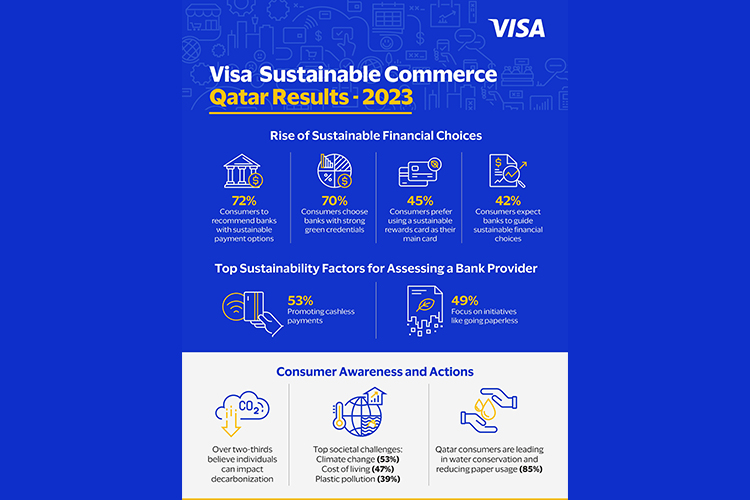Visa, a world leader in digital payments, released the Qatar results of their '2023 Sustainable Commerce' study today during the United Nations Climate Change Conference (COP28). The study scrutinizes consumer and business behaviors, and the readiness of infrastructure to support sustainable commerce. The survey reinforces the urgency for all industry stakeholders to take decisive collective action to promote sustainability through responsible innovation for the benefit of consumers, businesses and the economy.
Key Findings for Qatar:
Businesses and Sustainability
Qualitative interviews revealed that MSMEs and KOLs have a fair understanding of sustainability but lack a holistic and contextual comprehension of the concept. This gap is influenced by several barriers, including cost implications for both businesses and consumers, fear and resistance to change, pressures from competition and profitability, and resource constraints. However, there are also enablers that can foster sustainability. These encompass regulatory policies and frameworks that create the right ecosystem, sustainable financing that provides a 'push' effect, and the necessity for collaboration among stakeholders to drive sustainability. Visionaries, typically medium-sized businesses, grapple with significant pressure from global partners to adopt sustainability standards. However, they are often hindered by a lack of technical knowledge.
Shashank Singh, Visa’s General Manager for Kuwait and Qatar, said: "Over 42% of consumers in Qatar are turning to their banks for guidance in making more sustainable financial choices, highlighting the increasing demand for financial institutions to take an active role in promoting sustainability. In response to this need, Visa, in partnership with ecolytiq and QIB, has introduced the Eco Benefits Bundle. We are confident that these initiatives mark positive strides towards fostering sustainability through responsible innovation."
Visa is committed to facilitating sustainable commerce and contributing to the transition to a net-zero economy. Visa leverages digital payments to promote environmentally responsible consumption, sustainable transport, and Electric Vehicle adoption, while also reducing its own environmental footprint with a goal of net-zero emissions by 2040. In GCC, Visa recently launched the Eco Benefits Bundle, a groundbreaking climate banking platform in collaboration with ecolytiq and Mashreq in the UAE, followed by a launch with QIB in Qatar. This innovative solution integrates eco-friendly features into card payments, enabling users to track their environmental impact and contribute to carbon offset initiatives.
Conducted by 4Sight Analytics in Qatar, UAE, Saudi Arabia, and Kuwait, the '2023 Sustainable Commerce' surveyed 415 consumers in Qatar and interviewed business owners and key opinion leaders (KOLs) in August-September 2023. The study was designed to gather opinions and engage in meaningful discussions with a diverse range of participants.



